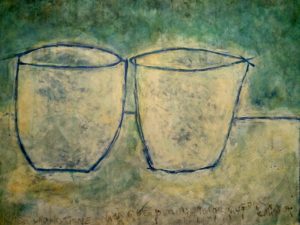
Last Friday night, we had two special guests over. Maya’s friends from the “mechina.” The “mechina” is a preparatory program our eldest daughter Maya chose to enroll past high school and prior to her army service.
Its official name: Joint Israeli Leadership Academy.
At the Academy teenagers from the Jewish and Arab sector advance their Hebrew and Arabic skills, hand in hand with travelling all over Israel to communities, people and projects worth meeting.
It is one thing to celebrate Shabbat as a family, and another to be hosting guests from the Academy who speak among them both Hebrew and Arabic.
We started dinner with “Kiddush,” the prayer over the wine, as we usually do on Friday nights. Met Aya and Etgar our two guests over a lively conversation, and past dessert all seven of us, played music and sang. The two guitars were up for grabs, while Etgar played his ukelele.
At some point, Aya asked whether we knew any song in Arabic, her mother tongue. Maya proudly said “yes” and started singing Asfur. Aya joined on the spot.
Asfur is a traditional Arabic song, Maya picked at the Jerusalem Youth Chorus over her many years of singing, dialoguing and performing with fellow Jerusalem teens. A song she knows by heart and connects wholeheartedly.
I was on the verge of tears. A dream come true.
Our daughter Maya with her friend Aya singing Asfour in Arabic at a Shabbat celebration in our home in Jerusalem.
A dream come true?
Whose dream?
What dream? You may ask if you are following closely.
The dream of Arab and Jewish people living harmoniously in a shared society of Israeli Jews and Arabs. A dream I discovered was possible back in 2009 when I took part in the Joint Ventures for Peace.
A dream I explored in my poetry book, “They All Sound Like Love Songs, Women Healing Israeli-Palestinian Relations.”
My generation of women have not achieved to make this dream a reality yet.
Though, as I was listening to Maya and Aya singing together, I could “hear” in the weaving of their voices, the voices of the Israeli and Palestinian women I encountered at the Joint Ventures for Peace, as well as the voices of the Jerusalem teenagers of different faiths Maya sang with at the Jerusalem Youth Chorus.
I could “hear” the voices of Aya’s parents and grandparents, the voices of her extended family, teachers and fellow pupils, the voices of the Academy’s teenagers, their parents’ and teachers’.
As we witnessed Aya and Maya singing together in our cozy salon in Jerusalem, it felt that at least a few hundred people, if not thousands, had made the weaving of their two voices possible.
As we witnessed Aya and Maya singing, we sensed an openness of heart. We sensed the love force at play cultivated by all those who have shaped them. An attitude of openness to meet the other, not through the media, but in person, face to face. A love force eager to know the other, as a person, a fellow human being.
“Aya, Maya and The Power of Love” then it is.
The power of love of all their ancestors, teachers, and friends. People who chose to open their heart to the other. Chose trust over fear, and love over hate.
At these coronavirus times, concert going and music playing in public have become out of reach; I wish I had live-streamed Aya’s and Maya’s singing from our Jerusalem salon, for their open-hearted voices opening hearts to had reached and moved you too.
From Jerusalem with love,